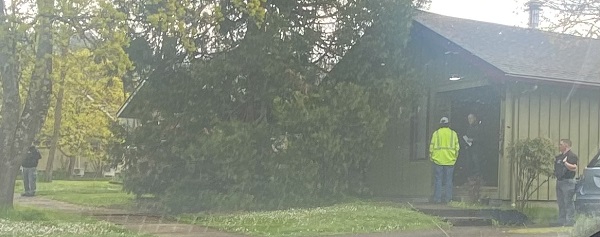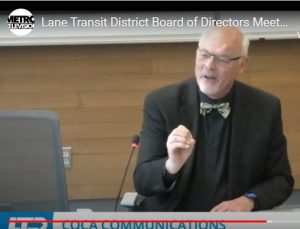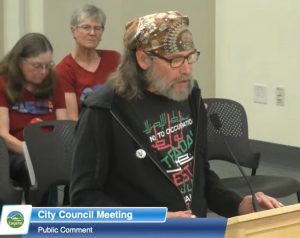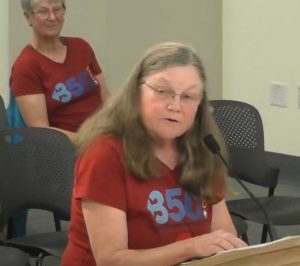Customers who would suffer from smart meters ask EWEB for true opt-out policy
12 min read
Customers tell EWEB they’ll go to court after the local electric utility failed to provide options for persons with electromagnetic hypersensitivity. They say the wireless communication built into so-called “smart meters,” also known as Advanced Metering Infrastructure (AMI), can be harmful to humans. During public comment April 2:
Kathy Ging: This is Kathy Ging, and I’m going to say that at EWEB’s 2010 annual retreat, John Brown remarked during the smart meter talk, ‘I expect some resistance from Eugene ratepayers.’ He got that right, as this is an intelligent and informed community on many topics.
1. AMI trajectory has been circuitous. Folks now question if it is true as a former EWEB staff informed a ratepayer, EWEB only has enough poles to service a third of its customers. Is poor planning a reason for recent unprecedented mandatory digital meter installs—usurping our rights to health preservation, privacy, security from hacking, fires, and explosions? Please answer today.
2. GM (Frank) Lawson, in remarks about himself at a public meeting, boasted EWEB differs from private IOU (Investor-Owned) Utilities that they interact less with people than publicly-owned utilities like EWEB do. Yet California is one of seven states dominated by IOUs, utilities by the way, with a robust opt-out program that is a true opt-out program. And about 50% of utilities do offer the opt-out, by the way.
3. Per 2023 smart meter study by OSU Corvallis Engineering Department, hacking of between 2.8% and 8% of meters can provide an interruption through an oscillation disturbance in the power lines. They say that these AMI improvements introduce new dimensions to attack the power grid. One of these consists in hacking AMI to control smart meter switches by altering the data or inserting false control data. With increased smart meter deployment, it becomes more likely to experience cybersecurity breaches.
[00:02:25] And finally, I’ve been in communication with an engineer who worked for 30 years for the military in a civilian capacity, and she specialized in sensors and satellites and everything in between regarding RF (radio frequency). She is prominently involved in the Virginia organization against smart meters, and she advises you to correct your course. She says that the system engineering analysis has not been done sufficiently in people’s homes and the whole system. And I’ve already sent you a couple of reports she provided me, reliable information about fires and explosions.
[00:03:01] Thank you for changing your course, and we appreciate your public service.
[00:03:05] John Q: Other local activists used their three minutes of public comment to jointly read two letters to the board.
[00:03:12] Joshua Korn: We’re reading a sequenced letter for the record.
[00:03:16] Smart meter opt-out programs exist because there are issues with these devices. We are going to demonstrate why your opt-out program needs immediate revision, especially to meet the needs of your most vulnerable customers.
[00:03:30] #1: Smart meter opt-out, genuine versus fake. ‘Opt out’ means to choose not to participate in something. Smart meter opt-out is commonly understood to mean the right of account holders to refuse the installation of smart meters, keeping their analog meters and revert to analog meters if smart meters were installed.
[00:03:53] It was so defined in EWEB’s statement of principles for the advanced metering project (AMI). Your decision to change the definition of ‘opt out’ to smart meter with radio off is (1) actually a pseudo opt-out and (2) out of step with other utility companies that provide genuine opt-out programs.
[00:04:17] EWEB’s opt-out program is a sham because smart meters with the radio off are causing the same types of health and safety problems as radio-on meters. EWEB customers were taken by surprise when informed about the change to a new definition of opt-out. As elected officials, you are ethically bound to be open, honest and transparent in your decision making, per the Oregon Government Ethics Commission code of conduct.
[00:04:48] Question #1: What was EWEB’s public process for changing what ‘opt out’ means? And how was this honest, open, and transparent?
#2: Dirty electricity, whether the radio is on or off. EWEB’s assertion about safety about smart meters with the radio off is strongly contradicted by evidence from independent scientists and doctors, and also by the fact that they are making people sick. In one case, the Nevada Customer Protection Bureau reached an agreement with the Nevada Public Utilities Commission to allow individuals to keep their analog meters in part because of health problems associated with the dirty electricity created by switch mode power supplies in smart meters.
[00:05:37] Question 2: If dirty electricity from these devices is of little importance, as you claim, then why are so many independent experts, such as the Building Biology Institute and National Institutes of Building Sciences, saying dirty electricity is an issue, and why are so many people getting sick from smart meters, whether the radio is on or off?
[00:06:03] Bekki Bruckner: Point #3: Invalid claims of smart meter safety. EWEB has been presented repeatedly with evidence that smart meters are not safe, and yet you continue to claim that they are. EWEB cites the FCC as the standard by which its decisions have been made. However, in 2021, the U.S. Court of Appeals for the District of Columbia Circuit ruled the FCC failed to acknowledge evidence of negative health effects when it decided that its 1996 radio frequency emissions guidelines protect the public’s health.
[00:06:45] Environmental Health Trust has stated that utility companies claim that smart meters and their networks meet government FCC limits. However, 20-year-old FCC limits based on 30-year-old science are not protective of human health and are hundreds of thousands of times too high to protect humans and wildlife from biological effects.
[00:07:09] EWEB also cites the World Health Organization as a source. However, the WHO’s International Agency for Research on Cancer classifies radiofrequency radiation as a class 2B carcinogen. A cost cannot be placed on health and safety and there is no financial justification for compromising either one.
[00:07:32] #4. EWEB’s broken contracts and intimidation of customers. EWEB has promised to prioritize customer safety, but evidence previously and repeatedly provided demonstrates this is not the case.
[00:07:48] EWEB has promised to treat customers respectfully and to enable customers to make the right choices for themselves. Yet EWEB is threatening people with service disconnection if they don’t accept a smart meter put on their home, a place where they have a fundamental right to protect their health and safety.
[00:08:08] Question 3: How does bullying customers to accept a product they do not want constitute respect or enable them to make the right choice for themselves?
[00:08:20] Dennis Hoerner: Hi, I’m Dennis Hoerner and I’m continuing this letter.
[00:08:23] Item #5. Principles and ethics demand a genuine smart meter opt-out option. The precautionary principle and ethics demand that you allow customers to refuse meters causing verifiable harms. To frame retaining or installing analog meters as being ‘too costly’ or in any other way denying customers the ability to protect their fundamental rights to safety for any reason is simply unjustifiable.
[00:08:55] #6. EWEB’s burden of proof and responsibilities. EWEB bears the burden of proof that you commissioners are providing safe service via your meter policy. You have been presented with information and asked a number of questions. The questions are not rhetorical, and it is your responsibility to answer them satisfactorily. As we have demonstrated, your opt-out program needs immediate revision. And it’s out of step with other utility companies, approximately 50% across the country do not require smart meters.
[00:09:33] Your policy must offer a genuine opt-out for customers specifying that they may retain or revert to an analog meter and backed up with a permanent guarantee of that choice. You are liable for your failure to do so. We await your reply.
There are many people who share these concerns and have come together in an informal group because we care about our lives. I had a scalp melanoma and I do not want to have radiation pouring into my bedroom at night. So I’m bathed eight hours a night.
[00:10:12] Even with the radio-off option that you call an option, there is significant RF. All RF has a biological effect on the body. I do not want that for myself, I do not want that for anyone in this room, I do not want it for the citizens of Eugene, and I appreciate all of your work that you do, I think you’re completely wrong with this policy, and I urge you to listen and to revise. Give us an option, a genuine option.
[00:10:48] EWEB: Next is Mark Hurwit.
[00:10:51] Mark Hurwit: I’m reading a notice before legal action to the EWEB board commissioners. This will also be a document read by several people.
[00:10:58] EWEB stated in its promises to customers on Feb. 1, 2024—promises that are contracts with us. This letter outlines how the commissioners are breaking these promises and incurring liability.
[00:11:11] EWEB’s first promise: The right to safety, privacy, and data security. Section 1: ‘EWEB will perform its activities in a manner that prioritizes customer safety and demonstrates sensitivity and responsiveness to environmental concerns.’
[00:11:26] Radiation pollution is an environmental concern. So-called ‘smart meters’ emit RF and EMF radiation that endangers the safety of customers and wildlife. That danger extends beyond customers’ homes to neighbors’ homes as well. Impartial scientists and health experts consistently demonstrate these dangers.
[00:11:43] Between 2011-2013, almost 100 customers provided evidence to you about customer safety and environmental concerns related to smart meters. Local public interest group Families for Safe Technology brought in national and international public health experts providing concise summaries of scientific smart meter research, as well as access to experts to consult with the board.
[00:12:04] After being presented with such extensive evidence, the EWEB Board of Commissioners, as well as the mayor and city council of Eugene, agreed that the customer safety concerns should receive priority. This board, in 2013, demonstrating sensitivity and responsiveness, enacted principles to prioritize customer safety, and required that the general manager develop policies guided by these principles.
[00:12:26] But in February of 2018, after the appointment of a new general manager, a full reverse of policy occurred—without transparent disclosure of the decision-making process. Carefully negotiated agreements with customers were abandoned without cause or comment.
[00:12:41] The Oregon Government Ethics Commission requires that you, as public officials ‘behave in an open, honest, and transparent manner.’ Those requirements are being violated.
[00:12:51] At the meeting when an updated metering policy was authorized, the board voted unanimously to uphold the statement of principles of the 2013 decision and required new policies conform with them. Those principles included the rights of customers to refuse the installation of smart meters, keep their analog meters, or revert back to analog if smart meters had already been installed. They would also protect the customers from utility policy mandates.
[00:13:13] Alison Price: Yet the following month of March 2018, the general manager presented the board with a new set of policies. One commissioner asked the general manager if the guiding principles established in 2013 and reaffirmed the month before had been rescinded.
[00:13:30] The general manager replied that they had. Having self-determined that the general manager and his staff self-determined that they were not bound to the board’s decisions, they rescinded them and generated new policy in contempt of the board’s decisions.
[00:13:45] Your oaths of office state you will faithfully perform the duties of Eugene Water and Electric Board commissioners for the city of Eugene. Your published promises to customers are contracts with us, as are the guiding principles of the advanced metering project.
[00:14:02] By failing to supervise your employees and uphold all customer contracts, including those related to public safety and environmental concerns, you have failed to faithfully perform the management duties of your office, and hence are criminally and financially liable for breaking your oaths of office.
[00:14:22] The customers of this utility are its owners who can and do hold you legally responsible for your actions.
[00:14:29] Section 2: ‘EWEB will minimize environmental impacts of its infrastructure and operations to what is necessary for effective and efficient operations.’ The radiation impact of advanced metering is a significant environmental impact. Increasing the efficiency of the operations by creating more than minimal environmental impact is prohibited by this promise to your customers.
[00:14:58] Broken promise, broken contract.
[00:15:02] Sabrina Siegel: Second promise: The right to responsive service and fair treatment. Section 1: ‘All EWEB customers will be treated promptly and respectfully without regard to age, gender, sexual orientation, race, ethnicity, disability, language proficiency, or social or economic status.’ Numerous account holders have disabilities which have been created or exacerbated by the radiation emitted from mandated EWEB metering equipment and have approached the utility with accommodation requests to keep and receive service with their non-radiation-producing, non-dirty-electricity-producing analog meters.
[00:15:50] Employees you manage have declined those requests, telling customers requesting disability accommodations that failing to install smart meters will disqualify them from receiving service. This violates federal law and is legally actionable. The Americans with Disabilities Act requires providing safe housing, workplaces, and access to services to all Americans, regardless of disability. Broken promise, broken contract.
[00:16:23] Section 2: ‘We commit to addressing grievances in a timely manner, including access to management, the board, or a formal appeals process.’ Customers have been presenting these grievances to the board for many months, and these grievances have not been addressed in a timely manner.
[00:16:43] You have not provided access to management or the board, nor have you provided a formal appeals process. You have ignored emails and phone calls on these topics. In your meetings, the only venue for public comment and questioning, you do not answer customers’ questions or provide follow through to get them answered later. Broken promises, broken contract.
[00:17:08] In summary, you are now in danger of being criminally and financially liable for breaking your oaths of office, failing to perform your duties, breaking the utility’s contracts with customers, violating federal law, discriminating against disabled customers, and causing harm to disabled and other customers.
[00:17:28] A course correction that enforces the carefully negotiated principles enacted in 2013 could relieve you of most of your liability and financial risk. It is imperative that you once again establish a genuine opt-out policy. Consumers may refuse the installation of smart meters. They may keep their analog meters. And if meters have been installed, they may revert to analog meters.
[00:17:58] And no penalties or extra fee will be allowed against customers making any of these choices. Completing this correction will keep you from legal prosecution that’s imminent. Thank you for listening.
[00:18:12] John Q: During public comment at the city of Eugene on April 8:
[00:18:16] City of Eugene: Our next speaker is Alfredo Gormezano.
[00:18:19] Alfredo Gormezano: Good evening. I came here to talk about EWEB acting like a dictatorship in our city, forcing smart meters on our houses and threatening ultimatums constantly that they’re going to shut off our power if we do not accept their smart meters on our house.
[00:18:36] Last time I came here to speak about this, there were no responses about it. I need responses. We need responses. This last time at the EWEB meeting, many people came to speak up against having these smart meters imposed upon our houses. And it was just walked all over by the EWEB board. It was walked all over by the operations manager.
[00:18:58] Last time I came to one of these meetings, I heard an EWEB board member thanking the city for giving them a $65 million check. And I said, ‘Please find a way to keep that money from going to the smart meters. Take it back. Defund that company. Talk about responsible investments.’ They are a dictatorship in our city and they’re acting, in my eyes, more like terrorists. I wake up every morning wondering: ‘Is my power going to be off today? Is it going to be off today?’ There are many people in our city that way.
[00:19:29] John Q: Public comments warn of forthcoming legal action and ask elected officials to respond to concerns about smart meters.
In a statement released April 15, EWEB said they own the meters, and under the customer service policy, can disconnect service if they are denied access. They said security guards are needed ‘because of direct and credible threats of physical violence made against EWEB employees.’
The statement did not address the public comments April 2 questioning the utility’s ethics and transparency while changing its opt-out policy. In saying that EWEB must serve ‘the greater benefit of the majority,’ EWEB appears willing to ignore a minority of customers who have testified for years about adverse health effects.
Image: Two EWEB security guards stand by as an EWEB employee informs a customer of the conditions of service: Unless the customer grants access to install the smart meter, service can be disconnected.





